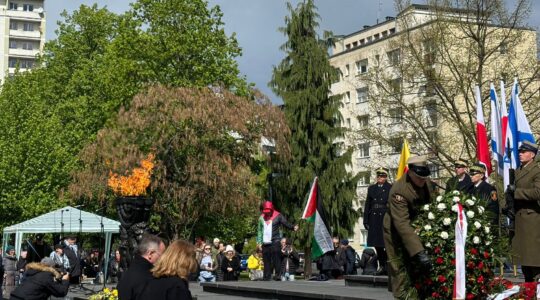MIRAMAR, Argentina (JTA) — It is said that there are two kinds of religious people in Miramar: the surfers who pray for the fantastic waves for which the Argentine beach town is known, and the Jews who flock here in the summer and turn Miramar into something resembling a shtetl.
And then there are the Jewish surfers.
Daniel Pezzente, who recently opened a bed and breakfast surfing school in town, said that four of his first students were observant Jews who kept kosher and took breaks from surfing to pray. Two were locals, but two came all the way from California.
In January and February, Miramar is to the Jews of Buenos Aires what Miami Beach during Passover is to the Jews of New York.
This country of 40 million has some 200,000 Jews, making the Miramar phenomenon rather rare. Located about 250 miles south of Buenos Aires and about a half-hour’s drive from the famed beach town of Mar del Plata, Miramar has become a favorite summer spot for the country’s Jews.
Mezuzahs are common on doorways here and restaurants in town offer Jewish fare such as kasha varnishkes and knishes. On the beach, families play Jewish games and sport Chai necklaces; even a few kipahs can be spotted there.
At night, some resorts organize Israeli dance performances.
“Jews are more than tourists here,” said Maria Eugenia Bove, secretary of tourism in Miramar. “They are part of the history and the future of this city. They are honorary citizens.”
The Jewish connection to Miramar dates back to the 19th century, when a ship full of Jews fleeing persecution in Europe arrived at Argentina’s shores in 1891. Financed by Baron Hirsch, the Pampa first landed at the port of Buenos Aires. The refugees were supposed to be housed in the province of Entre Rios, but their housing complex was not ready and the ship was ordered to sail farther south.
Eventually the Pampa’s passengers were put up at the Atlantic Hotel near Miramar, a city that had been founded only three years earlier.
“The first testimony of the relationship between our city and the Jews was marked by a devastating tragedy: a high number of children were infected with a disease transmitted by birds and died here,” said Carlos Pagliardini, Miramar’s director of tourism. “After this incident, most of the parents moved to Entre Rios province, and while there was no Jewish cemetery in Miramar, many returned to see the graves of their children.”
During the boom times in the 1950s, many of these immigrant families rose out of poverty to become middle class. For the first time they could afford to buy houses, send their children to college and enjoy a luxury that might have seemed impossible to their progenitors: vacations by the sea.
While Mar del Plata was the most popular resort destination in Argentina, it was not very welcoming of Jews.
“It was an expensive place, where the Argentinean upper class vacationing there didn’t always look favorably upon the arrival of Jews,” said Anita Weinstein, director of the Jewish community’s documentation center.
So the Jews began moving to Miramar, a beach town 27 miles down the coast from Mar del Plata and less expensive. The first set of buildings in Miramar was named for the Jewish Belmes family — the entrepreneur investors who developed modest buildings for sale while keeping some apartments for their own personal use.
Miramar quickly soared in popularity among the country’s Jews.
Ricardo Gaudini, owner of the Tiburon resort, said 85 percent of his February clientele is Jewish. The numbers are only slightly lower in January. Other resort owners report similar numbers.
“Even 35 years ago, my first clients were Jews,” Gaudini said. “Today, most families are also my friends. I was even invited to the bar mitzvah of many of the boys.”
Miramar has grown considerably more Jewish over time. In 1998, the city opened its first kosher store, selling falafel, the Sephardic specialty lahmajun and other delectables.
“I make the best knishes in Argentina,” boasted the store’s cook, Gladys Linares, who is not Jewish. “In the recent seasons we sold more than 30,000 meals, 2,200 pounds of meat and more than 1,000 pounds of chicken. We also offer kosher wine imported from the United States.”
Jacobo Simantov, who owns the store, also is in charge of the city’s synagogue. Beit Yaakov, which is open only during the summer months, makes Miramar the only beach town in the country with a summer synagogue.
On Jan. 15, anti-Semitic graffiti appeared on the street near the synagogue, and a meeting was arranged hastily with Miramar’s mayor. The crime remains unsolved, but it marks the exception rather than the rule in the town.
An event that took place on Feb. 6 was more typical: The Jewish community organized a street festival of Israeli dance in solidarity with the victims of the earthquake in Haiti.
As with past Israeli dance festivals in Miramar, the city offered public space and diverted traffic for the event.
“We really care for the Jewish community, which is critical to the development of our city,” Bove told JTA.
A monument in the city’s central square is dedicated to the victims of the 1994 AMIA Jewish community center bombing in Buenos Aires.
Recently the ultra-Orthodox, or haredi, presence in the city has been growing. To accommodate them, the beach spa Maui offers two rows of beach tents pitched in opposite directions so men and women cannot see each other. Next year the Tiburon resort will open a kosher grill. Coexistence is the rule in Miramar.
The prestigious La Nacion newspaper recently dubbed Miramar the star of the Argentine coast. If Miramar is a star, it’s a Star of David.





